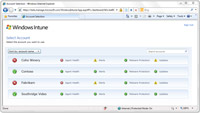News
Windows Intune Beta 2 Service Now Available
Microsoft rolled out a second beta of its Windows Intune service on Monday, but availability is limited.
The new management and security solution for Windows-based PCs, which is hosted globally and delivered as a service by Microsoft, can be tried by the first 10,000 organizations that sign up. Interested parties can register to use the beta service at the Windows Intune page here.
The beta is still somewhat limited, as users can manage from five to 25 seats max. Microsoft wants testers to have minimum of five seats to use this beta. For now, availability of the service is restricted to the United States, Canada, France, Germany, Ireland, Italy, Mexico, Puerto Rico, Spain and the United Kingdom.
The actual rollout of the service is planned for "early 2011," according to Alex Heaton, group product manager for Windows Intune, in a phone interview. At that time, the service will be available in the above-listed countries, and will be expanded in Europe and Latin America. Microsoft also plans to begin offering the service in parts of Asia then.
Windows Intune Components
Windows Intune includes a service that IT pros can use to provide management and antimalware protection for PCs in an organization. In addition, customers get upgrade rights to Windows 7 Enterprise edition.
The upgrade does not have to be performed right away, and Windows XP and Windows Vista users qualify for the upgrade. Typically, using the Enterprise edition of Windows 7 would require signing an "enterprise agreement" with Microsoft, but users don't have to have such an annuity agreement in place to use the Windows Intune service.
Pricing for Windows Intune will be $11 per PC per month. For an additional $1 per PC per month, Windows Intune users will have access to the Microsoft Desktop Optimization Pack, a collection of tools enabling capabilities such as desktop and application virtualization, advanced group policy management and more.
Heaton explained that Windows Intune users will have rights to upgrade to the next version of Windows. So, if Windows 8 is in the making, users would have the rights to move to that version when released. The service doesn't automatically upgrade the OS. Instead, that operation would be performed by an IT pro or Microsoft partner, according to the Windows Intune FAQ.
IT pros can manage Windows Intune themselves, but Microsoft foresees opportunities for its channel partners as well. Beta 2 of Windows Intune includes a multi-account console that will allow Microsoft's partners to manage multiple customer accounts via a single Web-based panel (see graphic).

[Click on image for larger view.] |
| Windows Intune Multi-Account Console. |
Heaton explained that when the service is launched next year, scalability won't be an issue. Subscribers will be able to use the service if they have one PC or several hundreds of PCs. Although Microsoft initially marketed the first Windows Intune beta back in April as a midmarket offering, emphasizing smaller organizations, Heaton said that the size of the organization won't matter when the Windows Intune service is launched.
"Our intention is that over time Windows Intune will scale to meet the needs of enterprise customers as well," Heaton said. "We want the customer to do everything they do on-premise today to be able do that from the cloud as well."
Heaton's statement seems to echo an observation made earlier by Forrester Research analyst Christopher Voce, who suggested that Windows Intune might represent the future of Microsoft's licensing.
Partner Benefits
Microsoft's partners will be able to manage hundreds of accounts. Partners will have revenue opportunities from the sales of the Windows Intune license, but that's just a small part of the offering, Heaton said. The service will eliminate costly partner trips to the customer's premises because Windows Intune is a remote service, he explained.
Partners who have signed up for the Microsoft Online Subscription Program will be eligible to provide the Windows Intune service to customers, Heaton said. It's the same program used with the Microsoft Business Productivity Online Suite (BPOS) offering. However, beta users don't have to be enrolled in that program to try out Windows Intune.
One partner that has been using the Windows Intune beta with customers is Vorsite, a Seattle-based Microsoft Gold Certified Partner system integrator that helps companies move to the cloud. Aaron Nettles, Vorsite's CEO, said that things have gone "very well."
"The feedback has been very positive from an IT pro perspective," Nettles said. "Being able to manage PCs and servers and get at a deeper level of monitoring, as well as the system updates and configurations -- that's been a plus, and very well received by our customer base."
Vorsite is bullish on the cloud, although it still does on-premises work. It currently has more than 100 customers using Microsoft cloud-base services. However, it wasn't always so bullish. Nettles said that early on, when he first wrote the Vorsite business model around Microsoft's BPOS offering, he didn't see the profitability, but that's all changed.
"There have been challenges that we've overcome, and I am starting to see this as a profitable business," Nettles explained.
In the next 12 months, online services won't eat into on-premises profits for partners, according to Nettles. Customers will either have a hybrid model or will still need on-premises products, he predicted. "Cloud isn't ready for the masses, being 90 percent of the businesses," he said. However, he predicted that cloud services would eventually exceed the revenue expectations that can be done with on-premises installations.
More on Windows 7 and the partner benefits of the Windows Intune service was emphasized today at the Microsoft Worldwide Partner Conference in Washington, D.C. in a keynote talk by Tami Reller, corporate vice president of marketing and CFO of the Windows & Windows Live Division.
About the Author
Kurt Mackie is senior news producer for 1105 Media's Converge360 group.